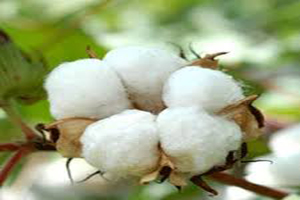
China world's largest cotton producer hit hard by soil residue
YarnsandFibers News Bureau 2014-01-27 16:45:00 – XinhuaChina the world’s top cotton producer in 1980s adopted plastic mulch technology, domestic agrotechnicians hailed it as a "white innovation." As film-mulched cotton fields have higher soil temperatures and conserve more moisture than normal land due to the greenhouse effect, which improves seeding, growth and yield. After 30 years of fanatical use of mulch films and inadequate attention to the problems of film residue, agrotechnicians said that the country's cotton fields have been hit hard by plastic pollution.
In the country's cotton base, Xinjiang Uygur Autonomous Region, mulch films are buried deep in the soil, with some rotted to shreds that can't be picked up by hand.
According to regional agricultural bureau chief Akbar Gopur, in the past when they turned up the land, the residue was there and very easy to clear. Now they can hardly find surface soil among the residue. The situation has emerged as a major environmental concern for the government, agrotechnicians, farmers and the general public. While the central government issued a policy document on Jan. 19 vowing to preserve every inch of farmland, the regional government is striving to offer solutions to the soil residue problem.
China currently accounts for about 30 percent of the world's cotton output, with only 15 percent of the world's cotton-growing land. In 2012, its cultivation area was 5.3 million hectares and the country had a total output of 7.62 million tonnes, while its unit yield was 85 percent higher than the world average, according to this month's Field Crops Research, an international scientific journal.
According to a sample survey conducted in 20 counties in Xinjiang by the regional agricultural bureau in 2011 and 2012, about 16.88 kg of plastic mulch has been left in every mu (about 0.067 hectare) of local cotton fields, almost five times the country's average.
In major producing areas in southern Xinjiang, the number even exceeds 40 kg. With so much residue, the land seems like it has been film-mulched ten times in one planting season, said Akbar Gopur.
This is like planting on scrap heaps. The aftereffects are reduced production and less income, said Qin Xiaohui, head of the resource and environmental protection station of the regional agriculture bureau.
Xiao Fulin, a farmer in Manas County, spent a lot of time getting rid of the residual mulch in his 40-mu field, but his efforts were in vain.
Scooping up a handful of soil, Xiao found four or five pieces of mulch film in his hand, with the longest measuring 30 cm. Heavy residues have blocked the water from penetrating into the soil, which is detrimental.
According to research by the Xinjiang Academy of Agricultural Sciences (XAAS), when the residues reach 52.5 kg per hectare, cotton production decreases by 15 percent.
It's not clear whether or not mulching film will pollute underground water and soil in other ways, said Dong Xinguang, an agricultural expert in Xinjiang.
However, the first national policy document of the year, "No. 1 Central Document," issued by the Central Committee of the ruling Communist Party of China has brought Chinese cotton farmers a glimmer of hope.
It said that China will start pilot restoration of contaminated farmland this year. A comprehensive plan to address prominent agricultural and environmental obstructions to sustainable development is also in the pipeline.
The document, which was issued on Jan. 19, stresses promotion of high-standard plastic mulch and mulch recycling, which local agrotechnicans said is important for the ongoing battle against soil residue.
By the end of 2012, more than 50 million mu of farmland was covered with plastic mulch in Xinjiang, almost one-fourth of the country's total film-mulched land.
Under national standards implemented in the 1990s, qualified plastic mulch should be 0.008 mm thick, though thickness is allowed to vary by 0.003 mm.
Qin Xiaohui said that in reality, farmers only bought 0.005-mm mulch to save on costs. But it's too thin for all of it to be recovered from the land after use.
Xiao Fulin also admitted that he used the thinnest allowed mulch films to save on costs. As the mulch film is priced by weight, thinner films cost him 12 yuan (1.98 U.S. dollars) less per mu.
To remedy the situation, some county governments started subsidizing farmers who use thicker mulch films in 2009.
The Yuli County Government in the Tarim Basin, for instance, offers a subsidy of 15 yuan for each mu of land. However, because of the financial restraints of local government, the policy covers only 140,000 mu, while 700,000 mu of land goes unsubsidized.
Complaints over the use of mulch films did not wane, despite the subsidies.
Farmer Sun Wenchuan from Yuli County said that it is not easy to collect the residue of thicker mulch films either. It's expensive and time-consuming and has to pay 3,000 yuan for manual collection of residue in his fields.
Li Zhong, head of Yuli County's agricultural bureau, admitted battling residual mulch has been difficult due to lack of effective recycling tools. Less than half of the mulch film could be collected from the soil by machine.
Fortunately, XAAS researchers have invented a recycling machine that can collect more than 80 percent of mulch from cotton fields. They are raising funds to put the machine into trial use before it can be produced in large quantity, said Wang Xuenong, deputy head of the agricultural machinery research institute of XAAS. He said that researchers are also testing the use of degradable mulch films.
According to Nurmohamed Zunun, deputy head of the rural environmental protection and energy development department at the regional agricultural bureau, to help establish a platform where government, farmers, enterprises and the general public can work together to ensure optimal mulch use the regional government has implemented a pollution abatement package for residual mulch.
Market Intelligence
Ask for free sample Report

experience
Customer Base
dedicated team
Countries Served Worldwide









